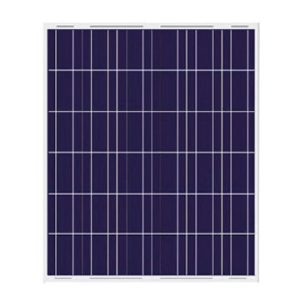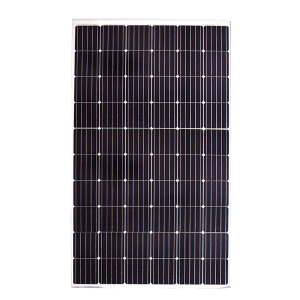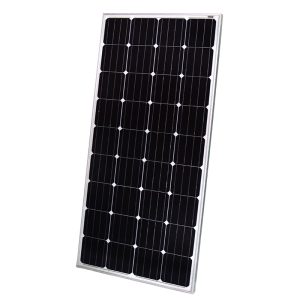As the world shifts towards renewable energy sources, solar power has emerged as a leading solution for sustainable energy generation. Among the various solar panel options available, the 320W 24V solar panel stands out for its efficiency and versatility. These high-performance panels are designed to harness the sun’s energy and convert it into clean, reliable electricity, making them an ideal choice for residential, commercial, and off-grid applications.
Understanding Solar Panel Efficiency
Solar panel efficiency refers to the amount of sunlight that a panel can convert into usable electrical energy. The higher the efficiency, the more electricity a solar panel can generate from a given surface area. Traditional solar panels have an average efficiency ranging from 15% to 20%, while the latest advancements in photovoltaic technology have pushed the boundaries, with some panels achieving efficiencies above 22%.
The 320W 24V solar panel from reputable manufacturers like SunPower and Renogy boasts an impressive efficiency rating of around 21-22%. This means that these panels can generate more electricity per square foot compared to lower-efficiency alternatives, making them an attractive option for installations where space is limited or maximizing energy output is crucial.
Factors Affecting Solar Panel Efficiency
Several factors contribute to the efficiency of a solar panel, including:
- Cell Technology: Monocrystalline and polycrystalline silicon are the most common cell types used in solar panels. Monocrystalline cells, which are made from a single crystal of silicon, tend to be more efficient but also more expensive. The 320W 24V solar panel typically uses high-quality monocrystalline cells to achieve its impressive efficiency.
- Panel Design: The way solar cells are arranged and interconnected within a panel can impact its overall efficiency. Advanced panel designs, such as those with half-cut cells or multi-busbars, can reduce electrical losses and improve performance.
- Temperature Coefficient: Solar panels tend to lose efficiency as their operating temperature increases. Panels with a lower temperature coefficient are better able to maintain their performance in hot climates or during peak sunlight hours.
- Anti-Reflective Coatings: Special coatings applied to the surface of solar cells can reduce the amount of light reflected away, allowing more sunlight to be absorbed and converted into electricity.
By optimizing these factors, manufacturers can produce highly efficient 320W 24V solar panels that maximize energy generation while minimizing the required surface area.
Performance and Applications of 320W 24V Solar Panels
The 320W 24V solar panel is a versatile and powerful solution for a wide range of applications. Its high efficiency and output make it suitable for both residential and commercial installations, as well as off-grid systems and remote power solutions.
Residential and Commercial Installations
In residential settings, 320W 24V solar panels can be used to power homes, reduce electricity bills, and contribute to a more sustainable lifestyle. These panels can be installed on rooftops, ground-mounted systems, or integrated into building designs. Their high efficiency means that fewer panels are required to meet a household’s energy needs, saving space and reducing installation costs.
Similarly, commercial and industrial facilities can benefit from the installation of 320W 24V solar panels to offset their energy consumption and reduce their carbon footprint. These panels can be deployed on large-scale solar farms or integrated into the building’s design, providing a reliable and cost-effective source of renewable energy.
Off-Grid and Remote Power Solutions
One of the key advantages of 320W 24V solar panels is their suitability for off-grid and remote power applications. These panels can be combined with battery storage systems and charge controllers to create self-sufficient energy solutions for cabins, RVs, boats, and other off-grid locations.
Their high efficiency and output make them ideal for powering various electrical loads, from lighting and appliances to communication equipment and water pumping systems. Additionally, the 24V output voltage of these panels is compatible with many off-grid power systems, simplifying the integration process.
Solar Panel Arrays and System Design
To meet larger energy demands, multiple 320W 24V solar panels can be connected in arrays. These arrays can be configured in series, parallel, or a combination of both, depending on the desired voltage and current requirements. Proper system design and component selection, such as inverters, charge controllers, and battery banks, are crucial to ensure optimal performance and safety.
When designing a solar panel system, it’s essential to consider factors like local weather conditions, shading patterns, and energy consumption profiles. Professional solar installers and system designers can help determine the appropriate number of panels, system configuration, and additional components needed to meet specific energy needs.
Environmental and Economic Benefits
Investing in efficient 320W 24V solar panels not only provides a reliable source of renewable energy but also offers significant environmental and economic benefits.
Reduced Carbon Footprint
By generating electricity from the sun’s abundant and renewable energy, 320W 24V solar panels help reduce reliance on fossil fuels and mitigate greenhouse gas emissions. This contributes to a cleaner environment and helps combat climate change, making solar power a sustainable and responsible choice for energy generation.
Long-Term Cost Savings
While the initial investment in a solar panel system may be higher than traditional energy sources, the long-term cost savings can be substantial. Once installed, solar panels generate electricity from the free and abundant sunlight, significantly reducing or eliminating electricity bills. Additionally, many governments and utilities offer incentives, tax credits, and rebates to encourage the adoption of solar energy, further improving the economic viability of these systems.
Increased Property Value
Installing efficient 320W 24V solar panels on a residential or commercial property can potentially increase its value. Properties with solar panel systems are often viewed as more attractive and environmentally conscious, appealing to buyers who prioritize sustainability and long-term energy savings.
Maintenance and Durability
One of the advantages of 320W 24V solar panels is their low maintenance requirements. These panels are designed to withstand harsh environmental conditions, such as extreme temperatures, wind, and precipitation. Most reputable manufacturers offer warranties ranging from 10 to 25 years, ensuring long-lasting performance and reliability.
Regular cleaning and inspection are recommended to maintain optimal performance. Depending on the location and environmental conditions, panels may need to be cleaned periodically to remove dust, dirt, or debris that can accumulate on the surface and reduce sunlight absorption.
Additionally, it’s essential to ensure that the solar panel system is properly grounded and protected from potential electrical hazards. Following the manufacturer’s guidelines and consulting with professional installers can help ensure the safe and efficient operation of the system.
Conclusion
As the world continues to embrace sustainable energy solutions, efficient 320W 24V solar panels emerge as a powerful and versatile option for residential, commercial, and off-grid applications. With their impressive efficiency, high output, and long-lasting durability, these panels offer a reliable source of renewable energy while contributing to a cleaner environment and long-term cost savings.
By investing in 320W 24V solar panels from reputable manufacturers like SunPower and Renogy, individuals and businesses can take a significant step towards energy independence and a more sustainable future. With proper system design and installation, these panels can provide clean, renewable energy for years to come, making them a wise investment for those seeking to reduce their carbon footprint and embrace a greener lifestyle.



